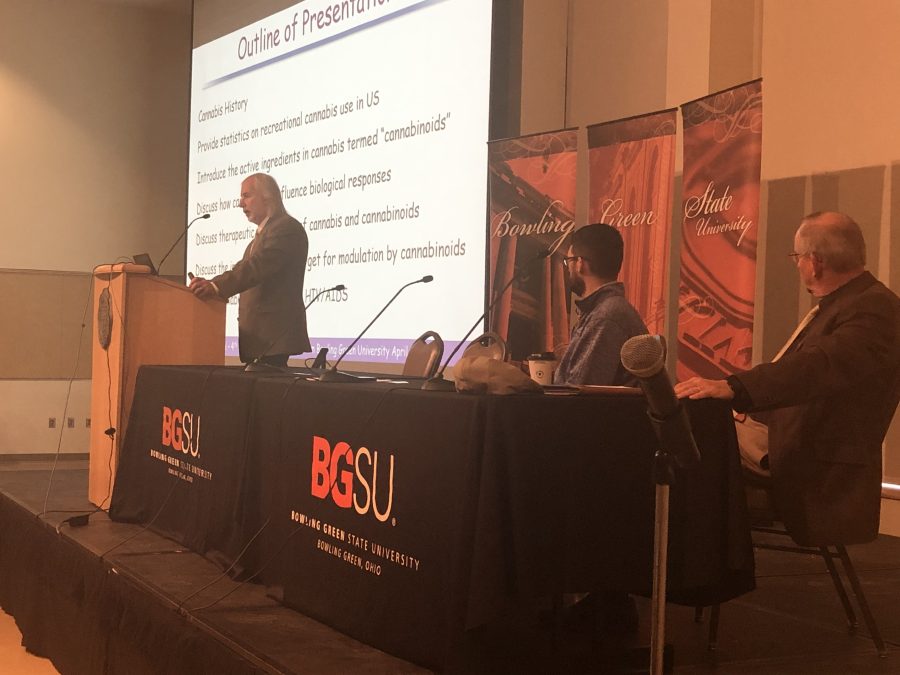Speakers at the fourth annual Public Health Symposium discussed topics under the theme “Is Marijuana Good for Public Health?” The symposium focused on subjects such as the science of cannabis use and the legal implications of medicinal cannabis. It took place in the Bowen-Thompson Student Union Thursday.
One of the topics of the conference was the impact cannabis use has on students and youth. Kyle Clark, project director for Wood County Prevention Coalition, discussed some of the adverse effects of cannabis abuse at an early age.
“When we make policy, it has been in the concern for adults. Only later do we consider the youth. We need to look at the side effects of these laws, particularly on children,” Clark said.
Clark also cited some of what he sees as the most terrifying statistics surrounding cannabis use and young people. He noted that 1 in 6 daily cannabis users who start young develop psychological addiction, an 8-point drop in IQ and double the chances for psychosis later in life.
Clark also spoke about how harmful consistent cannabis use can be for students.
“According to the research, abuse and usage by adolescents affects attention, motivation, memory and learning,” Clark said. “Students who use regularly tend to get lower grades, higher percentage of dropping out of school. Those who use regularly tend to function at a lower intellectual level.”
Clark stressed the importance of what he called four core preventative values: availability, perception of harm, peer approval and disapproval and parental approval and disapproval.
Clark said the marketing “big marijuana” uses heavily targets children. He points to several edible types of cannabis like gummies and sodas to claim cannabis distributors are looking to capitalize on a younger and underdeveloped market.
Milan Karna, coordinator of the Wood County Prevention Coalition, discussed the issue of cannabis bypassing the screening process of the Food and Drug Administration. This means the federal government does not know certain things about dosage, effectiveness and the quality of the drug.
George Buell, a senior sports management major, said he enjoyed the presentation but has more faith in his fellow students’ decision to use cannabis.
“I think that in college we are all adults And that everyone should be able to make their own decision when it comes to smoking or using marijuana or not,” Buell said.
The keynote speaker for the symposium, Norbert Kaminski, Ph.D., gave an outline of the legal history of cannabis in the U.S., described the chemical makeup of cannabis and discussed his own research with HIV patients. He also discussed some of the therapeutic uses people have for cannabis including: muscle spasms, multiple sclerosis and to increase the appetite of HIV/AIDS patients.
Kaminski’s research focuses on how the use of cannabis can affect the HIV virus and the immune system.
“Twenty-five to 50% of HIV patients use cannabis. So the premise that we’ve been exploring is that perhaps cannabinoids can suppress these monocytes from becoming activated in the periphery. And by doing so not only would we block the ability of that protein to be upregulated that allows the virus to gain entry into the monocytes, it would also block their ability to cross the blood-brain barrier and free a lot of these inflammatory proteins that are so damaging and lead to this neurocognitive disorder,” Kaminski said.
Kaminski’s study showed HIV patients using cannabis displayed a lower percentage of activated monocytes than those who did not. This means the inflammatory effects of the disease are much softer for those using cannabis than for those who do not.
Kaminski also discussed how the legal status of cannabis, being a Schedule I drug, and the lack of funding makes his research somewhat difficult.
“Michigan State University has a moratorium on providing subjects with cannabis. So sometimes the DEA will show up at my door just making sure that I am following the law federally,” Kaminski said.
Erin Reed, coordinator of the Ohio Medical Marijuana Control Program, discussed some of the more legal implications of Ohio’s passing of House Bill 523, which allows for medicinal cannabis to be used in the state. She discussed some of the goals of OMMCP including being patient-centered and consistent.
There are currently 21 medical conditions that qualify individuals to get medicinal cannabis recommended to them. The term “recommended” was referenced frequently and another way in which physicians can circumvent the fact that cannabis is still federally illegal.
“I think that the law aspect is the one that I was most interested in,” senior healthcare administration major Nick Bac said. “Especially just how the government goes about regulating medical cannabis.”
Philip Welch, Ph.D., the coordinator of the symposium, said this was the most successful symposium yet. The symposium had the largest attendance of any of the previous years it had been held, with over 150 people registered.
“I think that students need to be cautious about using (cannabis),” Welch said. “Listen to the physical and mental impacts that cannabis can have on you. As well, look at how it could impact your future job prospects. It could be particularly beneficial to students.”























